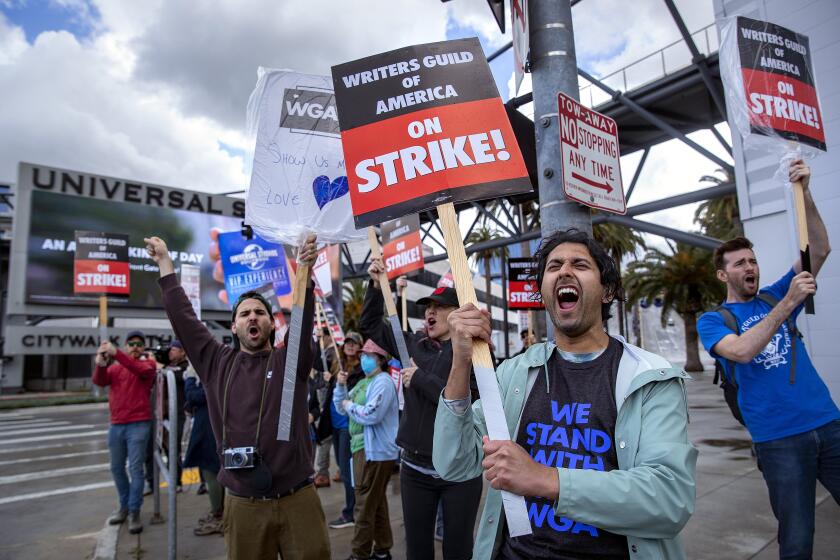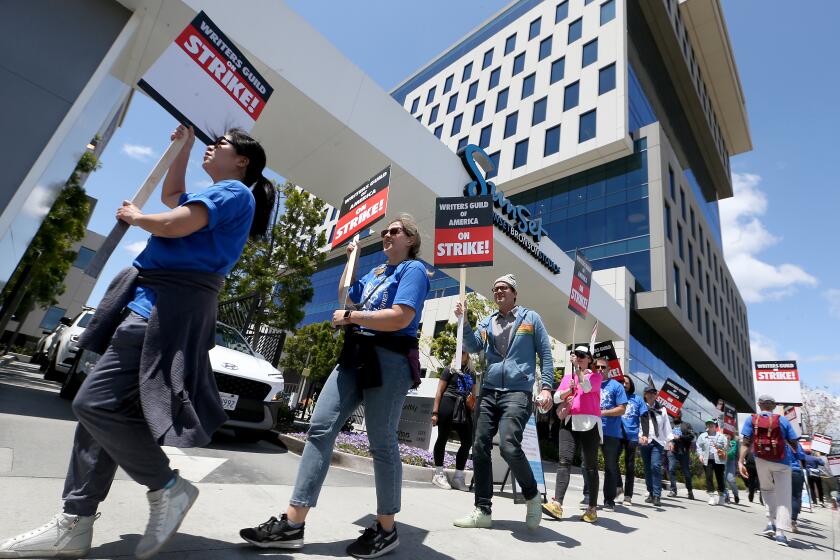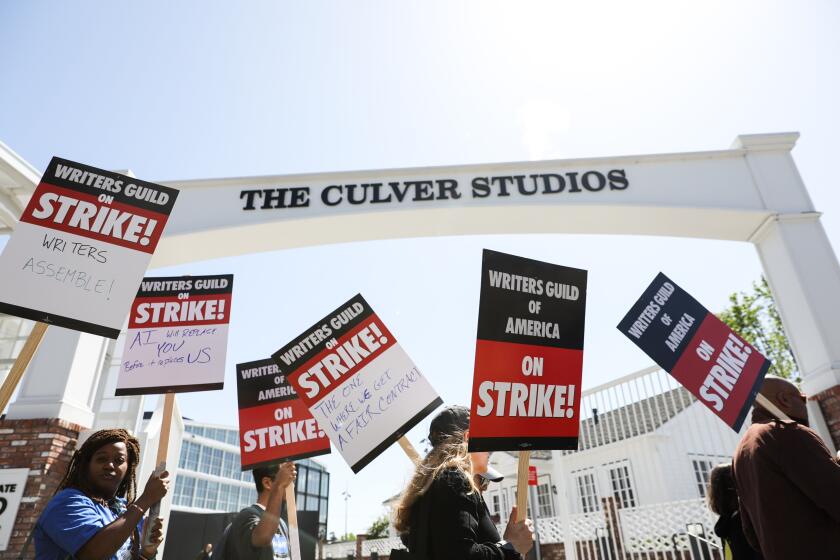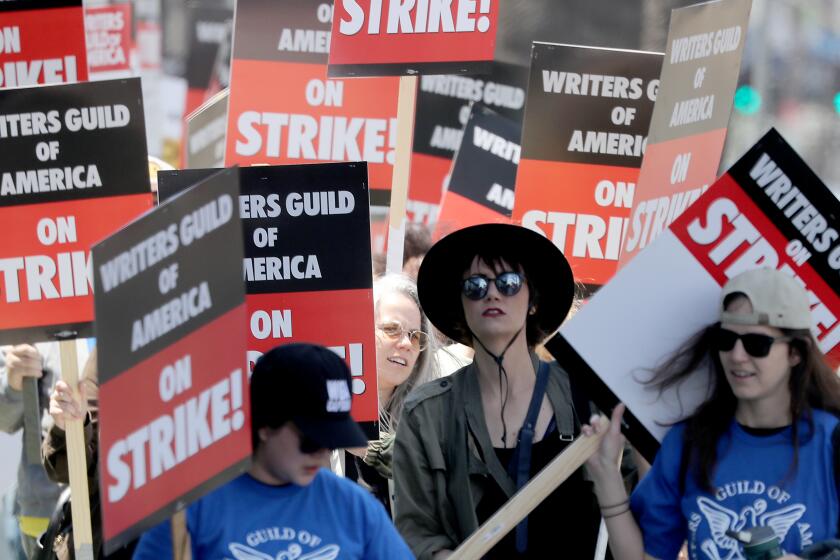How to tap the WGA strike funds and other financial aid during the writers strike
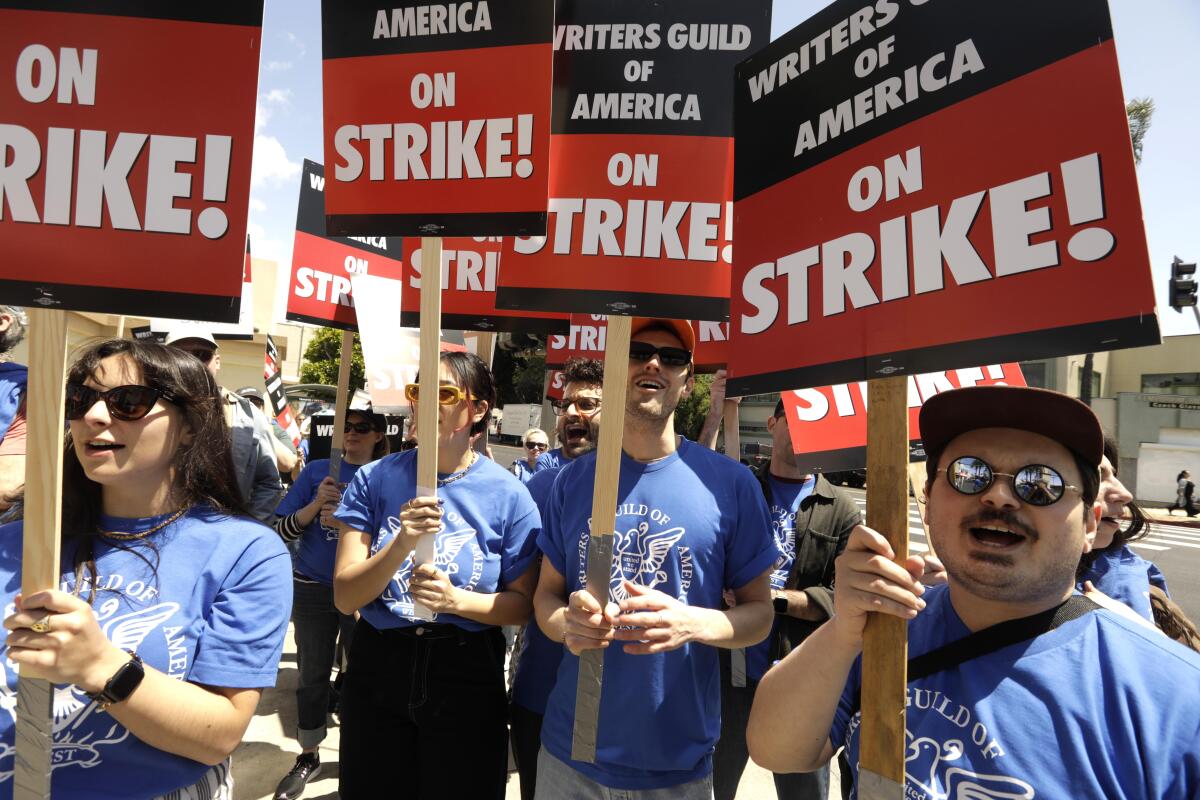
- Share via
Now that the Writers Guild of America is on strike, where can its members turn for help paying the bills?
According to WGA strike rules, a strike means “no writing services—including pitching and development ... may be performed for a struck company by a Guild member.”
The Guild cannot require members to stop performing duties unrelated to writing, but many workers throughout the industry will be financially affected by the shutdowns that will inevitably follow the strike.
Hollywood writers formed picket lines in L.A. and New York after the Writers Guild of America called a strike for better pay and working conditions.
In most states, including California, employees on strike are not entitled to unemployment insurance benefits because they are still considered employed. One exception is that employees in New York can file for unemployment after a two-week waiting period.
Because Hollywood is a gig industry where pockets of unemployment are not uncommon, most applications for financial help during the strike will require proof of significant hardship. For those in need, here are some options to consider.
For most people who write for film and TV, the gigs are anything but steady. So while the strike is a more definitive interruption, this is a workforce that’s accustomed to finding other ways to make ends meet.
WGA strike funds
Both the East and West branches of the WGA have strike funds, which they plan to distribute as loans or grants. Union members can find more details on the criteria for no-interest or low-interest loans on the Writers Guild of America West and Writers Guild of America East websites.
As of March 2022, the Writers Guild of America West had collected over $20 million in strike funds, according to its most recent annual report. These funds are administered by the WGA Strike Fund Committee. A Strike Fund contact form is also available on the website.
The Good and Welfare Emergency Assistance Fund
The Good and Welfare Emergency Assistance Fund has offered temporary assistance in the form of interest-free loans for Writers Guild of America West members since 2005.
For the record:
4:47 p.m. May 2, 2023A previous version of this story stated that former members of the WGA needed to pay an annual fee to qualify for loans from the WGAW Good and Welfare Emergency Assistance Fund. Former members do not have to pay for this service.
The loans, which are administered by the Motion Picture & Television Fund, are available to current and former members who are experiencing acute financial distress. Applicants may receive as many as two loans of up to $7,000 each, for a total lifetime amount of $14,000.
To begin the process, contact the Motion Picture & Television Fund Community Social Services by calling (323) 634-3888 to leave a message. A professional will call back in about a day — later if the call volume is high.
Eligible applicants will receive a case plan and loan recommendations that will be submitted for consideration. If applicants are rejected, they will be informed of the reasons why and provided with additional referrals.
Motion Picture & Television Fund grants
Created by Mary Pickford and other top Hollywood figures in 1921, a few years before sound came to motion pictures, the MPTF is a charitable relief organization funded by contributions from the entertainment industry. Among other things, the fund offers grants to anyone working in the entertainment industry who falls on hard times.
Any entertainment industry worker with a “demonstratable financial need” stemming from the WGA strike can apply for temporary help. Decisions about eligibility and grant amounts are made on a case-by-case basis. Counseling, confidential help and referrals to other resources are also available.
To apply, call the fund at (323) 634-3888 or toll free at (855) 760-6783, or email info@mptf.com.
What can you work on, or not, during the writers’ strike? Here’s what Hollywood writers need to know.
Entertainment Community Fund’s emergency financial assistance program
The Entertainment Community Fund’s emergency financial assistance program offers emergency financial assistance to support performing arts workers who are unable to pay their basic living expenses. This includes housing, food, utility bills and healthcare.
These funds are available for both union and nonunion workers, but applicants need to provide documentation to prove that they have a history of earnings in professional performing arts and entertainment. Eligibility depends on how long the applicant has worked in the industry and the type of work performed.
The 2023 writers’ strike is over after the Writers Guild of America and the Alliance of Motion Picture and Television Producers reached a deal.
Through this website, applicants can also apply for funds for:
- Casting Society Cares (for casting professionals)
- IATSE Local 600 Hardship Fund (for cinematographers)
- IATSE Local 798 Members Assistance Program (for makeup artists and hairstylists)
“For over 140 years, the Entertainment Community Fund has been a safety net for those working in the performing arts and entertainment community, including in times of greater need,” said Joe Benincasa, president and CEO of the Entertainment Community Fund.
The Entertainment Community Fund also offers help with health insurance coverage and mental health support, he said.
Applications and more information can be found on the Entertainment Community Fund website. You can also make a tax-deductible donation to support the Entertainment Community Fund.
Streaming has transformed television and led to a surge in content, but it also has squeezed Hollywood writers. Five Writers Guild of America members share their stories.
Union Plus
The WGA also recommended Union Plus as a resource for Writers Guild of America East members.
Union Privilege is a nonprofit that provides Union Plus benefit programs exclusively to union members and their families. Those who have previously signed up for the programs can apply to receive benefits.
Union Plus credit card and loan holders can apply to get $500 as assistance. Those who have been Union Plus mortgage holders for at least 12 consecutive months can receive up to six monthly mortgage payments as a grant during a union-approved strike.
Other support for Union Plus participants includes layoff or furlough assistance, credit card counseling, hospital grants and medical bill negotiating services.
Careers in the entertainment industry can be mysterious for those just starting out, and even for those working in the business. The Los Angeles Times brings you explainers and advice for starting and building your career in Hollywood.
SAG-AFTRA Foundation Emergency Financial Assistance Programs
Though the SAG-AFTRA Foundation’s Emergency Financial Assistance funds are not specific to the writers’ strike, there is support if SAG-AFTRA members find themselves in urgent financial need due to an unexpected life crisis.
Hardships covered by these funds include a “natural disaster, accident, catastrophic illness/injury, emergency medical bills not covered by insurance, house fire, eviction, evacuation, death in the family” and more. Email assistance@sagaftra.foundation or call (323) 549-6773 for more information.
Inevitable Foundation’s Emergency Relief Fund
The nonprofit dedicated to “empowering mid-level disabled writers” is distributing grants starting at $500 to those in need. To apply for a grant, fill out the online application, which can also be obtained in plain text by emailing advocacy@inevitable.foundation. Go to the website for more information on future funding rounds and how to donate.
If you have information about other funds that should be added to this list, email The Times Utility Journalism Team at utility@latimes.com.
About The Times Utility Journalism Team
This article is from The Times’ Utility Journalism Team. Our mission is to be essential to the lives of Southern Californians by publishing information that solves problems, answers questions and helps with decision making. We serve audiences in and around Los Angeles — including current Times subscribers and diverse communities that haven’t historically had their needs met by our coverage.
How can we be useful to you and your community? Email utility (at) latimes.com or one of our journalists: Jon Healey, Ada Tseng, Jessica Roy and Karen Garcia.
More to Read
Totally Worth It
Be your money's boss! Learn how to make a budget and take control of your finances with this eight-week newsletter course.
You may occasionally receive promotional content from the Los Angeles Times.
